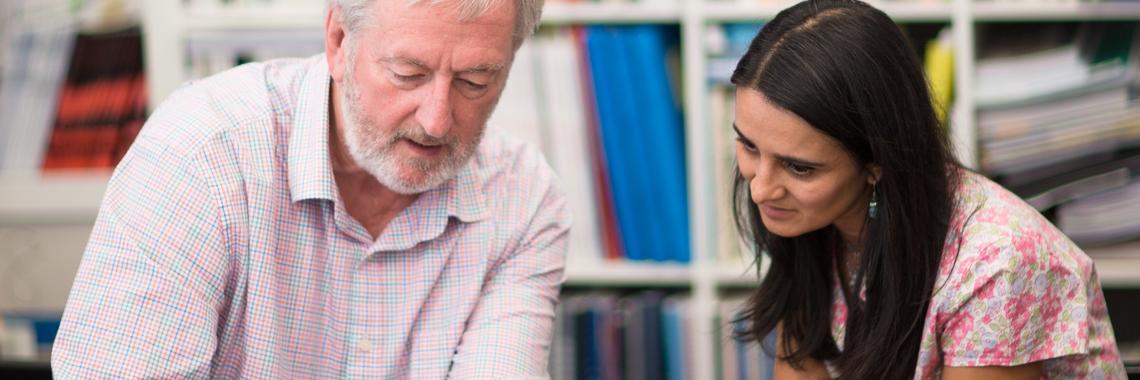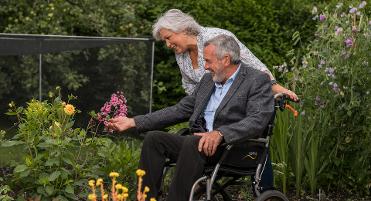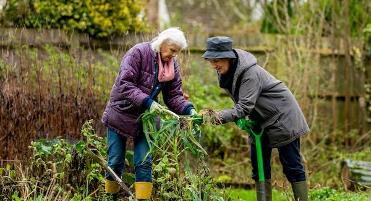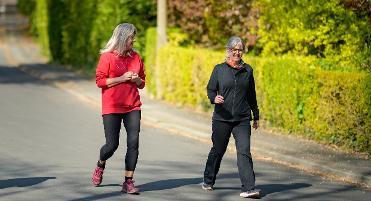HEALTHY AGEING COMMUNITY HUBS
HEALTHY AGEING HUBS: 2025-2028
Introduction
The Elderly People’s Integrated Care System (EPICS) was initiated by The Helen Hamlyn Foundation in the 1980s. The current research (2020-2026) has been funded by the Helen Hamlyn Trust and the MRC. The lead academic for this research programme is Professor Sarah Harper; Professor of Gerontology at the University of Oxford, a Fellow at University College and Director of the Oxford Institute of Population Ageing.
Challenges
Demographic and economic trends in recent decades have put unrelenting pressure on health and care systems. At the same time, financial austerity policies and the ongoing impacts of the Covid-19 pandemic have reduced resources for health and social care services, despite the increased prevalence of long-term conditions associated with ageing (e.g. dementia, diabetes and chronic pain). Reducing service needs by older people is a strategic priority for the sustainability of health and care systems.
In January 2019, the NHS published its LongTerm Plan Health infrastructure plan: a new, strategic approach to improving our hospitals and health infrastructure. Pivotal to the delivery of more personalised, preventative healthcare in the NHS Long Term Plan is more community and primary care away from hospitals. This sits alongside various initiatives including the People at the Heart of Care: adult social care reform white paper (2021), and the follow-on reports: Accelerating reform in adult social care in England: priorities for innovation and scaling (Nov 2023) and Adult social care system reform: next steps to put People at the Heart of Care: A plan for adult social care system reform 2023 to 2024 and 2024 to 2025 financial years (April 2023), all grappling with Social Care in a post-covid UK.
Conceptual Model
The NHS Long Term Plan has a strong focus on the treatment and prevention of illness by supporting people to adopt improved healthy behaviours. At the heart of this plan is a new ambition for integrating primary care, improving the access, experience and outcomes for our communities, with a particular emphasis on helping people to stay well for longer as part of a more ambitious and joined-up approach to prevention.
The extensive literature around healthy ageing and well-being has identified the following 6 key factors
We believe that if every older person had access to each of the above 6 pyramids within their local community their health and wellbeing would measurably improve and their transitions to ill health and dependency be delayed.
Aims of Healthy Ageing Hub
To facilitate healthy ageing and wellbeing through supporting community services to enable older adults to remain in their homes for longer, thus delaying transitions from independence to dependence, and therefore reducing demands on local authority and health services, family and other forms of support and care.
Objectives
To enable neighbourhood networks and other community assets in achieving this aim.
Diet: The role of nutrition and diet is now seen as one of the key factors promoting healthy longevity. This pyramid includes access to healthy foods (avoiding food deserts), diet advice and community support to eat well.
Exercise: There is increasing evidence that physical activity helps prevent many long term conditions such as cancer, heart disease, stroke, diabetes, dementia etc. and increases general mental wellbeing.
Social: social interaction has been identified as a key component of healthy longevity, while loneliness has a key detractor. Through supporting meaningful community relationships, enabling social inclusion, and tackling loneliness, this pyramid also includes involving the Voice of older people and providing information, advice, advocacy, activities and social opportunities.
Health Care: Through integrating local and community integration of primary health care, social services, voluntary organisation and private enterprises at the grassroots and community level, enabling multiple service providers – public, private and voluntary – working together to support older people through a co-located network.
Built Environment: Places play a vital role in our health and our local environment is an important influence on our health behaviours.
Natural Environment: There is evidence that high exposure to natural environments such as green space and gardens in communities is associated with higher wellbeing amongst older people.
Here we explain the rationale and purpose of new work on Healthy Ageing Hubs, the distinctive contribution of each Hub, and the manner in which the evaluation will occur.
Context
Facilitating integrated care to enable frail older adults to remain in the community
It is now recognised that a priority is to enable frail older people to stay at home for as long as they wish. The keeping and caring for frail elderly people within the community is thus of importance. However, the ability of frail older adults to maintain good health, high quality of life, and independence is often predicated on enabling environments and access to support from families and communities. Policy discourse and health systems have been slow to catch up, with resources still concentrated on acute care in hospitals and care homes. The economic case for preventive care delivered in or near citizens’ homes is strong. However, effective and consistent delivery of community-based care to the frail to enable them to remain in their own homes remains elusive.
The Healthy Ageing Hubs will enable older frailer adults to remain in the community through:
- Facilitating person-centred integrated care enabling easier access to statutory services,
- Providing information guidance on the range of options available,
- Co-ordinating activities to promote wellbeing,
- Ensuring professional support to care workers both formal and informal (family and volunteers).
Using unique access to Oxfordshire County Council health and social care data, and policy makers, we have identified 4 different socio-economic and geographic communities within Oxfordshire, with the potential to support a healthy ageing hub.
We engaged with county and local stakeholders including primary health and care service providers, voluntary sector stakeholders and local authorities to identify the communities in which we undertook the research.
We drew upon local initiatives such as NHS Social Prescribing led by Primary Care Networks and initiatives built on healthy place shaping, to inform our thinking.
We undertook extensive mapping of existing local assets and engaged in-depth with residents in the selected pilot site areas to understand their experience of care in both physical and virtual spaces. This asset database can be found here. We have inputted some of the data from our asset list onto interactive maps to visually represent the starting locations for two of our hubs and are in the process of inputting the asset data for our third hub. This process allows us to create an interactive and georeferenced map that provides a clearer, more spatial understanding of our assets than a simple list, which is particularly useful for logistical planning and operational oversight. You can view these maps here.
We interviewed a diverse range of participants, gaining multiple perspectives from those with different levels of engagement with formal and informal care services, different familiarity and engagement with technology, and different opportunities for physical mobility linked to health status.
This in-depth qualitative approach enabled insights about people’s relationships to a range of spaces at various scales: from buildings (e.g. home or healthcare setting) to open environments (e.g. public spaces) including the institutional, domestic, familial, community, public, voluntary and private contexts.
We used the go-along interview method to gain deeper insights into the everyday experiences of ageing and the impact of the environment, including neighbourhood and social infrastructure, on older adults.
We studied the working activities of local link workers, and health and social care providers.
Allowing older participants to navigate their local surroundings and highlight areas of significance or challenge, we captured nuanced person-place interactions and cultural dynamics. This included the accessibility of neighbourhood amenities, the quality of social infrastructure, and the extent to which these factors influence older adults' daily lives.
Three Healthy Ageing Hubs
After undertaking exploratory research in four Oxfordshire communities, it became clear that three of the communities were appropriate for taking this idea forward. In collaboration with the 3 selected communities, we have been able over the past three months to develop an agreed template, which all three are willing to support, and adapt to their specific needs. All three communities are willing to work with us, employ facilitators, connect with health and social care services, and develop activities for three years. They also confirmed that they had strong existing relationships with their local Health Centres. They agreed to provide healthy ageing services for 4 days a week, and to ensure that frail, housebound older adults were specifically bought into the centre.
Community One
This is a poor disadvantaged community in the city of Oxford; the healthy ageing hub is based around an existing food bank and community centre.
Community Two
A market town; the healthy ageing hub is a community-funded centre supporting those in rural isolation, poverty, loneliness, debt, and mental health challenges, with a strong focus on older adults.
Community Three
A large rural village; the healthy ageing hub is based on two existing facilities serving the interests of both active older adults and frailer housebound rural adults.
Hub Buildings and Organisation
Hub buildings have been identified in each community.
Community Hub One is based in the Community Centre which already supports a food bank and occasional community activities. It comprises a large activity room, office space, kitchen and a range of meeting rooms. It has a full time manager for the building and management committee and has commitment from the local NHS General Practice and the local Health and Social Care Centre. Stakeholders include the local NHS General Practice and the local Health and Social Care Centre, AgeUK Oxfordshire, Anna Chaplaincy, local transport, local police, volunteers and food and nutrition providers. The hub will employ a dedicated Parish Nurse.
Community Hub Two is based in an established community hub in the centre of the market town with a café, community kitchen, several large rooms and smaller meeting rooms. It has a full time manager for the building and a management committee and has commitment from the local NHS General Practice and stakeholders include the local NHS General Practice, Anna Chaplaincy, local transport, volunteers, and food and nutrition providers, local therapists and community workers. The hub will employ a dedicated Parish Nurse.
Community Hub Three operates from a Day Centre. It is a little earlier in its planning than the other two hubs but already has identified the Hub co-ordinator, engaged with local transport, volunteers, and meal providers, local therapists and community workers. This hub has already identified isolation and loneliness as its major planning theme.
Evaluation Metrics
Over the three years we shall continue to evaluate the effectiveness of the Healthy Ageing Hubs, with a focused concentration in the final six months. This will be undertaken using both qualitative and quantitative analysis.
Quantitative
The team have already drawn on existing health and care datasets held by Oxfordshire County Council – where one of our team members, Dr Zhang, has been seconded - to develop the methodological framework for evaluating the EPIC Network Healthy Ageing Hubs.
During this process we have:
- Identified the relevant datasets for future evaluations.
- Developed indicators and created metrics for health outcomes, health inequality, service use.
- Designed our evaluation framework including a multi-composite performance metric.
Primary care data (CPRD) and linked hospital statistics (HES) are being explored alongside relevant local-level data (e.g., social care data held by Local Authorities) to develop the analytical framework. This will determine rates of assisted living and residential care support, health and wellbeing outcomes at key transition points, utilisation of formal health and care services, and cost-effectiveness indicators for a given locality.
These will be employed to test the hypothesis that Healthy Ageing Hubs can increase health and wellbeing and reduce transitions to higher-intensity care over a longer term.
- For each healthy ageing community we are identifying baseline analysis which will determine what proportion of people might be expected to transition between three broad states of care needs: independent living with or without family care; independent living with formal care support; and move to institutional care.
- For each healthy ageing community we will create a model of these transitions which we will then test over the three years in order to evaluate the impact of the Hubs in slowing down the transitions to each state of dependency.
- We are examining the factors that drive the transitions, and the financial implications.
Qualitative
The qualitative in depth data will supplement the quantitative findings and add richness and explanation of our findings. It will also allow co-creation of the analysis by older adults themselves, their families and member of the health and social care professions. We are drawing on local initiatives such as NHS Social Prescribing led by Primary Care Networks and initiatives built on healthy place shaping.
Stakeholder interviews: county and local stakeholders including primary health and care service providers, voluntary sector stakeholders and local authorities will provide a panel in each community who will be interviewed across the project.
Older adult focus groups: In each community a panel of older adults have been identified who will provide valuable feedback on the progress of the healthy ageing hubs across the three years.
Bibliography
- Reframing Ageing in Place: The Go-Along Method as a Transformative, Participatory Research Tool Chiara Natalie Focacci*, Sarah Harper*
- ‘We Rely on Each Other’: How Secondary Ties Transform Ageing in Place Chiara Natalie Focacci*, Kate Bancroft*, Anthony Howarth*, Melina Malli*, Sarah Harper*
- ‘It’s Reading Between the Lines’: How Link Workers Translate Needs and Bridge Older Adults to Community Resources, Chiara Natalie Focacci*, Sarah Harper*
- Policy Implications of Hubs and link workers, Chiara Natalie Focacci*, Kate Bancroft*, Anthony Howarth*, Melina Malli*, Sarah Harper*
- The Steep Climb to Care: A Combined GIS and Narrative Perspective on Resource Accessibility for Older Adults in Rural Oxfordshire (Kate Bancroft, Hannah Grove, Ana Osorio Betancourt, Sarah Harper)
- Advanced Spatial Methods for Public Health: StoryMapping Community-Based Determinants of Ageing in Place Using ArcGIS and Digital Narratives (Kate Bancroft and Ana Osorio Betancourt, Sarah Harper )
- Malli, M.; Potter, C.; Harper, S. (2024) Person-centred Integrated Care Networks for healthy ageing in place: a scoping review. Population Horizons ISSN: 2451-3121.
- Potter CM, Malli M, Harper S (2024) Community-based person-centred integrated care (PIC) networks for healthy ageing in place: a scoping review protocol. BMJ Open, 14:e083077. doi: 10.1136/bmjopen-2023-083077
- Malli M, Harper S (2025) Community-based networks supporting ageing in the community: a scoping review”
- Health and Social Care in the Community





